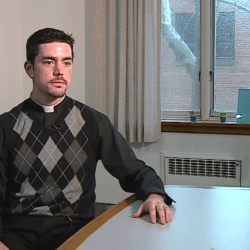As people take a closer look at the working paper for the upcoming Synod, one issue about marriage and family life that is notably absent is the question of married priests. I knew a few people who were wondering if this topic would come up—or if the bishops might even decide to explore the unresolved issue of ordaining women as deacons. Clearly, these are not front-burner issues—though the pope and a few high-ranking figures in the Vatican have mentioned the obvious fact that celibacy is not dogma, and the pope even suggested in one recent conversation that married men could be ordained as priests, if the bishops want it.
Since discussion on this topic won’t go away, and it is related closely to other subjects that the bishops will be discussing, it might be worth a second look at something I posted last fall:
A few observations:
- If—and it’s a big if—the rules regarding priestly celibacy are one day relaxed, it does not mean that priests will start dating. Those already ordained will not be allowed to marry. This has never been a practice in the church, even in the Eastern rites (which have always had married clergy.) You can expect that tradition to continue. In a nutshell: men who are married can be ordained, but men who are already ordained cannot get married. It’s a distinction, but an important one.
- Some people in the pews (and in blogging comboxes) have set off alarm bells, asking “How can a parish afford to support a priest and his family?!” I’d encourage people to look at Latin rite parishes that already have married priests (many, thanks to the Anglican Ordinariate). In most cases, the priest has an outside job—often as a teacher, administrator or chaplain—and that income (along with whatever his wife may earn at her job) supports the family. Also, the family usually has its own home and does not live in the rectory.
- With married priests holding down outside jobs, this requires a greater sharing of responsibilities at the parish level, with deacons and lay people taking over many areas that had previously been managed by the priest. If married priests take a prominent place in the life of the Latin rite Church, the people in the pews will need to change their understanding of how a parish operates, and make some adjustments to their own expectations of the priest’s role.
- If—and it’s a big if—the Bishop of Rome thinks it’s prudent to change the rules of celibacy, it’s entirely possible he will defer to the local churches, and let each regional bishops’ conference determine whether it wants the discipline changed. This happened with the restoration of the diaconate; most dioceses in the United States embraced it while some, for a variety of reasons, did not. (Likewise, in each diocese to this day there are wildly varying notions of when the deacon should preach, how he should dress, and how formation is undertaken.)
- Then there’s the issue of divorce. People who know more about these things than I do report that the divorce rate among married clergy in some bodies (Episcopal and Unitarian, among others) is roughly the same as the rest of the population. There’s no reason to expect it to be much different among Catholics. (I haven’t been able to find divorce stats for Eastern rite clergy. If anyone has some, pass ‘em on!)
- One last, lingering question might be: what impact would a married priesthood have on the diaconate? Would it sap vocations? Would married men who might feel called to serve as deacons elect, instead, to become priests? Would there be a stampede of deacons, looking to be ordained priests? I don’t think anyone can answer these questions now. The teaching of the Church holds that the diaconate and the priesthood are two entirely separate callings, and Rome right now remains reluctant to ordain as a priest a man who has been a permanent deacon.
It may be interesting to see if the Church begins to have any discussions about this topic, beyond fevered speculation in the media and on blogs. Speaking as a married member of the Catholic clergy, I can report that juggling two vocations, as deacon and husband, is a challenge. Often, in fact, a daunting one. (Ask any deacon or married priest and he’ll probably say the same thing.) It ain’t easy. If the Church plans to go in this direction, it merits serious—and very careful—study and a considerable amount of prayerful discernment.
But I wouldn’t get too worked up about this. It’s safe to assume that Pope Francis has more important things to worry about right now.
Meantime, if you’re curious for more, check out the thoughts of a married priest, Fr. Dwight. He knows whereof he speaks.
Meantime, a reader passed along this older article on clergy divorce (from 1989) from the Philadelphia Inquirer:
Church officials and sociologists estimate that 15 to 20 percent of the clergy in mainstream Protestant denominations – which include Presbyterians, Lutherans, Methodists, Episcopalians, American Baptists and members of the United Church of Christ – have been divorced. That is still far lower than the divorce rate in the general population; the general estimate is that half of all marriages end in divorce.
Church officials and researchers say that, in part, the percentage of Protestant clergy with a divorce in their background has gone up in tandem with the number of clergy who entered the ministry as a second career. Many, especially women, come to ordination already divorced, according to a recent Episcopal study. One such woman is Barbara Harris, recently consecrated the first female bishop of the Episcopal Church.
Among conservative Protestant denominations, such as the Southern Baptist Convention, divorce still is usually a major blow to a clergy career.
Divorced persons “are almost disqualified” from ordained ministry in Southern Baptist churches, according to Bruce Grubbs, manager of pastoral leadership for the Baptist Sunday School Board in Nashville.
Even in more liberal denominations, divorce can still disrupt a clergy career, especially in rural areas and small towns.
















